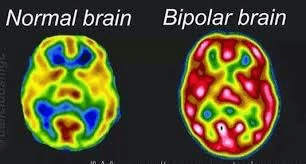What Causes Bipolar Disorder in the Brain


What Causes Bipolar Disorder
There are many contributing factors that go into what causes bipolar disorder in the brain but It is not yet clear if changes in the brain caused bipolar disorder, or happened as a result of bipolar disorder.
Most doctors do believe that bipolar disorder is caused by an imbalance in the brain chemicals or the brain structure.
Or at least that’s the theory. But no doctor knows the exact cause of this mental illness.
There are several factors that go into diagnosing bipolar disorder and not just one single cause.
Brain and Bipolar Disorder experts think that bipolar disorder is caused in part by an underlying issue in particular brain circuits and in the function of brain chemicals called neurotransmitters.
Researchers think the abnormal function of the brain circuits involved in serotonin, as the chemical messenger, is responsible for mood disorders (depression and bipolar disorder). Norepinephrine and serotonin are linked to mood disorders, such as depression and BPAD.
Psychcentral.com – Causes of Bipolar Disorder
A Chemical Imbalance
Three chemicals in the brain function–norepinephrine, serotonin, and dopamine–dopamine is involved in mental disorders.
An imbalance in brain chemicals called neurotransmitters can lead to symptoms of bipolar disorder.
Many experts attribute the bipolar disorder to a low or high concentration of chemicals in the brain.
Bipolar disorder can alter your brain’s chemical balance Experts think that bipolar disorder is linked to chemical imbalances in the brain.
Some people just have a genetic risk for bipolar disorder because of the genetics of their family and their mental health history.
As stated, there are many factors that go into a diagnosis but most doctors determine that it is because of the chemical imbalance in the brain..
When cells are not producing or metabolizing energy the way they normally should, the resulting imbalance of energy in the brain can cause changes in mood and behavior often seen in bipolar disorder.
If and when fluctuations occur, too much or too little of these brain chemicals may cause bipolar episodes that are either manic or depressive.
Having less gray matter in your brain may also lead to feelings of slowness and disappointment, and difficulty performing simple tasks when experiencing a depressed bipolar episode.
Psychiatry.org – What Are Bipolar Disorders
Bipolar and Genetics
Severe mania or depressive bipolar episodes can involve psychotic symptoms, such as hallucinations or delusions.
Bipolar disorder, a severe brain disorder, causes extreme changes in mood, energy, or function, and may range from episodes of mania (high) to episodes of depression (low).
In fact, the team from the University of Michigan says no single genetic shift, chemical imbalance, or life event is behind every case of bipolar disorder.
All they do know is that there are many factors to determine when diagnosing someone with bipolar disorder.
A study from researchers at San Francisco VA The San Francisco VA Medical Center indicates people suffering from bipolar disorder can experience progressively worsening brain damage.
Brain cells Loss or damage of brain cells in the hippocampus can contribute to mood disorders. This brain damage can sometimes be permanent.
Bipolar and the Brain
Bipolar disorder can cause part of the hippocampus to shrink The hippocampus The hippocampus is a region of the brain important for emotional control, including stress responses, as well as for memory formation and retrieval.
Research has also linked the hippocampus, part of the brain involved in learning, memory, mood, and impulse control, with mood disorders.
The Role of Mitochondrial Experts also thinks that mitochondria–which you might remember from science class as the cells that produce energy, also known as the powerhouses of the cell–may have something to do with developing mood disorders.
Scientists are not 100% sure whether bipolar disorder causes fluctuating neurotransmitter levels, or vice-versa, but they know medication and therapy may be helpful for treating episodes in people who are bipolar.
These extreme, intense emotional states, or mood episodes, can impact the person’s ability to function.
Symptoms may trigger unpredictable changes in mood and behavior, leading to considerable distress and hardship in life.
If a person is on a stable medication regimen along with therapy, then they can live long productive lives.
The main aspect is to find the right medication’s that best fit the person with bipolar.
This might take some test and trial to find the right ones that stop the mania and help the depression.
Here is a Great Video Below That Explains Bipolar and the Brain in More Depth
Leave a Reply